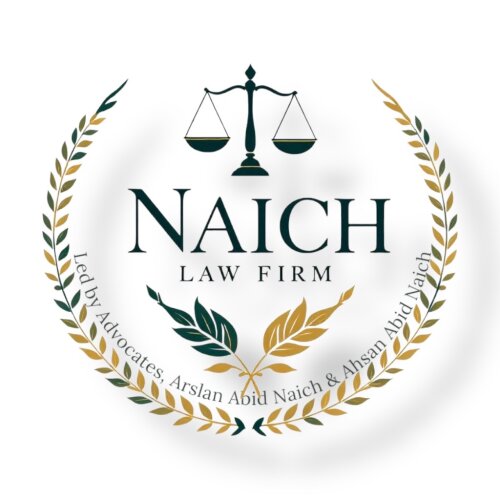Best Private Client Lawyers in Karachi
Share your needs with us, get contacted by law firms.
Free. Takes 2 min.
List of the best lawyers in Karachi, Pakistan

Bharucha & Co. (Advocates & Intellectual Property Attorneys-Pakistan)
15 minutes Free ConsultationAbout Private Client Law in Karachi, Pakistan
Private Client law in Karachi, Pakistan covers a wide range of legal services tailored to individuals and families rather than businesses or corporations. This area of law includes matters such as estate planning, wills, probate, trusts, wealth management, inheritance, tax planning, family settlements, and guardianship. Legal professionals specializing in Private Client law help ensure the protection, management, and transfer of personal wealth in accordance with applicable laws. As Pakistan’s commercial capital and its largest city, Karachi presents unique legal and cultural considerations that Private Client lawyers address to serve the needs of the local and expat population.
Why You May Need a Lawyer
There are several situations where individuals in Karachi might require a Private Client lawyer. These commonly include:
- Drafting or updating wills to reflect personal wishes or changes in family circumstances
- Navigating the inheritance process following the death of a loved one, especially in complex family dynamics
- Establishing trusts for asset protection, charitable giving, or future planning for minors and dependents
- Resolving disputes over property or inheritance shares under local and Islamic succession laws
- Managing family business succession and transition plans
- Seeking guidance on minimizing taxes and optimizing wealth transfers
- Appointing guardians for minors or vulnerable family members through legal procedures
- Handling cross-border assets and family members, which may require compliance with international as well as local legal frameworks
Local Laws Overview
Private Client matters in Karachi are governed by a combination of statutory laws, Islamic Sharia principles, and customary practices. Key laws and regulations include:
- The Succession Act, 1925 - governs inheritance and probate matters for non-Muslims
- Muslim Family Laws Ordinance, 1961 and relevant provisions under Sharia law - lay down rules for distribution of estates among Muslim families
- The Trusts Act, 1882 - establishes the legal framework for the creation and administration of trusts
- The Guardians and Wards Act, 1890 - regulates the appointment of guardians for minors
- Gift and property transfer laws, including registration requirements under the Registration Act, 1908
- Local municipal and tax regulations affecting property and wealth transfers
Complying with these laws can be complex, especially because inheritance matters often involve emotions, disputes, and multiple parties. Legal professionals help navigate these intricacies to ensure lawful and fair outcomes.
Frequently Asked Questions
What documents are needed to make a valid will in Karachi?
A valid will in Karachi generally requires the testator to be of sound mind, of legal age, and the will must be written, signed by the testator, and witnessed by at least two individuals. Legal counsel can ensure all formalities are fulfilled to avoid disputes.
How is property distributed among heirs under Islamic law?
Islamic law prescribes specific shares for each legal heir. The distribution is based on Quranic guidelines, with spouses, children, and parents typically receiving defined portions. The process can be complex if there are many heirs or questions of legitimacy.
Can non-Muslims in Karachi follow their own inheritance laws?
Yes, non-Muslim residents have their inheritance and succession governed by the Succession Act, 1925 or other relevant personal laws, which differ from the rules applicable to Muslims. Consulting a lawyer ensures the correct law is applied.
Is it possible to challenge a will in court?
Yes, wills can be challenged in cases of suspected fraud, undue influence, lack of capacity, or improper execution. The courts in Karachi examine the evidence and may declare a will invalid if any legal requirement is not met.
What is probate and is it always necessary?
Probate is the legal process through which a deceased person’s will is officially recognized by the court and the executor is authorized to distribute the estate. It is usually necessary if the estate includes significant movable or immovable property.
How can trusts be used for asset protection in Pakistan?
Trusts can be created to manage assets during one’s life and for future generations. They help protect assets from disputes, creditors, or tax issues, and provide structured wealth transitions, especially for minors or disabled dependents.
What happens if someone dies without a will?
If a person dies intestate (without a will), their estate is distributed according to the relevant succession laws - either Sharia law for Muslims or the Succession Act for non-Muslims. This can sometimes result in outcomes different from the deceased’s personal wishes.
How are disputes among heirs resolved?
Disputes are often resolved through mediation, negotiation, or litigation in the civil courts. A Private Client lawyer can guide parties through these processes, aiming for amicable settlements or representing clients in court if needed.
Are foreign assets and expat heirs covered by Pakistani law?
Dealing with foreign assets or heirs abroad involves the interplay of Pakistani law and international regulations. Legal advice is crucial to ensure all legal, tax, and procedural requirements are met on both sides.
How can I choose the right Private Client lawyer in Karachi?
Look for a lawyer with specific experience in estate planning, inheritance, trusts, and family matters. Seek recommendations, check professional credentials, and ensure good communication for a productive client-lawyer relationship.
Additional Resources
If you need more information or assistance, consider reaching out to:
- Sindh High Court Bar Association - For attorney directories and resources
- Pakistan Bar Council - Regulatory body for lawyers in Pakistan
- Legal Aid Society Pakistan - Offers legal awareness and some pro bono support
- The Citizens Advice Bureau, Karachi - Community support and basic legal guidance
- Federal Board of Revenue - For information on inheritance and wealth taxes
- Local District Courts of Karachi - For filing probate and succession cases
Next Steps
If you believe you need legal assistance in any Private Client matter in Karachi, start by gathering all relevant documents such as property deeds, family registries, identification papers, and any existing wills. List your questions and objectives clearly to discuss with your lawyer. Seek out a qualified Private Client lawyer by checking references or reputable law firm websites. Schedule an initial consultation to understand your legal position and the options available. Remember, early legal advice can help prevent future disputes, save costs, and ensure your wishes and interests are properly protected.
Lawzana helps you find the best lawyers and law firms in Karachi through a curated and pre-screened list of qualified legal professionals. Our platform offers rankings and detailed profiles of attorneys and law firms, allowing you to compare based on practice areas, including Private Client, experience, and client feedback.
Each profile includes a description of the firm's areas of practice, client reviews, team members and partners, year of establishment, spoken languages, office locations, contact information, social media presence, and any published articles or resources. Most firms on our platform speak English and are experienced in both local and international legal matters.
Get a quote from top-rated law firms in Karachi, Pakistan — quickly, securely, and without unnecessary hassle.
Disclaimer:
The information provided on this page is for general informational purposes only and does not constitute legal advice. While we strive to ensure the accuracy and relevance of the content, legal information may change over time, and interpretations of the law can vary. You should always consult with a qualified legal professional for advice specific to your situation.
We disclaim all liability for actions taken or not taken based on the content of this page. If you believe any information is incorrect or outdated, please contact us, and we will review and update it where appropriate.
Browse private client law firms by service in Karachi, Pakistan
Karachi, Pakistan Attorneys in related practice areas.














